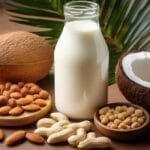Ashu’s Curiosity
Hi Guys, I am Ashu, and back with a new curiosity.
This time it is not related to me but was raised by my dear friend Iqbal, a devoted Muslim who is preparing himself for the upcoming holy month of Ramadan.
Ramadan is a sacred month for every Muslim & similarly Iqbal during these days strictly observe fasting for the continuous 30 days.
But Iqbal is also facing the problem of obesity & wants to control his weight during the month of Ramadan.
He asked me to make a list of healthy iftar foods that he must include in his diet during Ramadan, so that at the end of the holy month. He can lose some weight rather than gain more.
For that reason, I searched about it on my favourite platform Know Ur Diet, Let us discuss what I found on it:
What is Iftar?
Iftar is an important part of the fasting during the holy month of Ramadan. Iftar is a term used for the foods that a Muslim takes to complete their fast.
Your choice of iftar foods plays a crucial role in maintaining your health throughout the holy month. You cannot ignore its significance because it provides you with the required dose of energy & nutrients to care for your daily chores along with fasting. It is the first meal that you get after a long observation of a fast without water & food.
At the same time, heavy or high-calorie foods in Iftar can upset your stomach & disrupt your weight management goals.
Interesting fact about Iftar
The record of the longest iftar table for Muslim devotees during the holy month of Ramadan is organised in the newly built administrative capital of Egypt. The table was 3100 meters long & hosted at least 7000 people at one seating.
10 Healthy Foods for Iftar
As we have discussed, a healthy iftar diet is needed to take care of your required calories during the holy month of Ramadan. But you must ensure that your choice for iftar should be healthy & balanced with all essential nutrients.
Here are 10 healthy foods for iftar during the holy month of Ramadan:
Dates
We will begin our list of healthy iftar foods with dates because of their significance in breaking fast. Even Prophet Mohammad had a habit of consuming dates in Iftar during Ramadan.
Even scientifically, consuming dates after a long period of fasting can fulfil your nutritional needs. Dates are a natural source of sugar to boost your energy needs. Also, dates are easy to digest & rich in antioxidants.
Dietitians recommend that dates should be part of your daily meals even on normal days because of its multiple health benefits.
“When one of you breaks his fast, let him break it with dates for they are blessed. If they are not found, let him break it with water for it is pure.”
– Prophet Mohammad
Water
After a long period of fasting without water, it is necessary to hydrate your body with liquids. This is required to prevent the risk of dehydration & other health issues such as constipation. Water is also critical to wash out toxic materials from the body through the urinary system.
To make water more nutritious & richer with natural sugar, add some jaggery to it. This can boost the energy levels & provide some cooling effect to the body especially when you are fasting during the hot summer season.
Read more: 10 Health Benefits of Drinking Warm Water
Soup
Soups are always preferred as a healthy food but during Ramadan, you can consider it one of the healthy iftar foods. This is because soups not only provide you with essential nutrition & calories but also hydrate your body at the same time.
You can make your soups tastier & healthier by adding vegetables like spinach, carrot, kale & sweet potatoes. They are easy to digest & provide smoother movement of stool through the stomach preventing constipation.
If you are a person who wants to include only low-calorie foods in Iftar then soup should be part of your meal plan.
Whole Grains
Your healthy iftar diet should include whole grains like oats, brown rice, quinoa & barley because they are rich in antioxidants & nutrients like dietary fibers & protein. Dietary fibers help you to feel satiated for a long period. It prevents sudden spikes of sugar in the blood.
Proteins in whole grains can support muscle recovery & muscle mass by preventing any sort of muscle wasting. Also, protein helps to maintain a healthy metabolism throughout the fasting period.

Nuts & Seeds
Nuts like almonds, walnuts, cashew nuts & pistachios are rich sources of various antioxidants & nutrients. Overnight-soaked dry fruits in water can hydrate your body & dietary fibers in them can help you improve digestion & prevent sudden spikes in blood sugar.
Similarly, seeds like Chia seeds & Sunflower seeds increase the nutritional content of your healthy Iftar diet. You can drink water with chia seeds after breaking fast to hydrate your body & provide the required energy.
Read More: 10 Best Nuts for Weight Loss and Ways to Consume
Lean Protein
Because in Islam eating non-vegetarian foods like meat, chicken & poultry is allowed, you can add lean protein like chicken breast & eggs to your diet. These foods are rich sources of protein that can help you in muscle recovery & improving metabolism.
Lean protein foods are healthy & assist in weight management because they are low in calories & unhealthy fats. It is recommended to use healthy oils like virgin or extra virgin oils such as olive oils to fry, grill & roast lean protein foods.
Read more: Should You Eat Chicken Breast for Protein?
Curd
Loaded with bioactive compounds & probiotics, curd can be a great addition to your healthy iftar foods list. The major benefit of curd is that it provides ease of digestion by stimulating the growth of gut bacteria.
Not only that, curd is also a rich source of protein which is helpful to boost & maintain metabolism. Similarly, antioxidants in curd boost immunity against illnesses & it is also a food that reduces bad cholesterol levels (LDL).
Herbal Teas
Dietitians recommend that drinking masala chai should be avoided during Ramadan because it contains milk & sugar. They both can make it high in calories & can upset your digestive system. Rather you should replace it with herbal teas like green tea, chamomile tea & mint tea.
The reason behind this is that herbal teas provide a lot of antioxidants & vitamins to boost your immunity & improve digestion. Moreover, Herbal teas can fulfil your caffeine requirement without upsetting your stomach.
Fruits
Nutritionists suggest that an iftar diet containing plenty of fruits such as grapes, apples, watermelon & oranges is the best way to remain healthy throughout Ramadan. The reason behind this is simple, fruits provide a wide range of nutrients, antioxidants & micronutrients to support your health & immunity.
Moreover, Fruits are low in calories & rich in healthy fats. These healthy fats allow lower bad cholesterol (LDL) & increased good cholesterol (HDL).
Legumes & Beans
If you are a person who wants to add plant-based protein sources to the diet then legumes & beans are the great option. Not only that, legumes are also rich in dietary fibers making them a perfect suit for healthy iftar foods.
You can add legumes like kidney beans, chickpeas & peanuts. Other than proteins & fibers, they can also provide complex carbohydrates. These carbohydrates provide instant energy & they are easy to digest.
Read more: Health Benefits of Peanuts: its Uses and Risks
Some Healthy Practices During Ramadan
After discussing Healthy iftar foods, we are highlighting some healthy tips that you should follow during Ramadan for a better fasting experience:
Avoid Overeating
Ramadan is a month of self-discipline & endurance. This should be visible in your dietary habits as well. You should avoid over-consumption of food that can upset your stomach and complicate your fasting.
Stay Hydrated
Ramadan fasting restricts you from eating or drinking between sunrise & sunset. So, you only have less time to hydrate your body. To tackle this, you must drink as much liquids as possible during Iftar &Suhoor. Add foods that contain water such as fruits & vegetables like watermelon & orange.
Exclude Sugary & Fried Foods
To maintain your health throughout Ramadan, it is necessary to avoid foods such as high-sugar & fried foods. These foods are infamous for energy crashes & upset stomach. If you can’t avoid then minimise their intake.
Take Adequate Sleep
For every Muslim, Ramadan is a month of devotion & constant praying. But you shouldn’t compromise on sleep hours. Sound sleep is required to feel energetic throughout the day & for mental wellbeing.
Conclusion
Iftar is an integral part of Ramadan that helps you to nourish your body with required nutrients. It is also important that whatever you eat during Iftar should be healthy & balanced. Your selection of Iftar foods for Ramadan should be based on nutritional value & calorie intake.
There are other healthy practices that you should follow during Ramadan to make your fasting more satisfactory & devotional to the supreme one.




